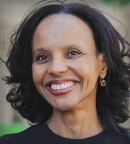The road to my breast cancer diagnosis in 2018 was long and tortuous. For 3 years leading up to the diagnosis, I had imaging scans and tissue biopsies every 3 months because of suspicious masses in my breasts. The uncertainty was so destabilizing that I was in a constant state of emotional unrest. During a biopsy of my left breast, which was a magnetic resonance imaging–assisted core biopsy, the physician removed so many tissue samples that he basically gave me a mini-lumpectomy, all without any type of anesthesia or sedative.

Sylvie Leotin
The result of that biopsy found that the mass was benign, and I was told to come back in a year for a follow-up mammogram screening. Concerned that the finding was a false-negative, I insisted on having an excisional biopsy, which was positive for cancer. I received the news via e-mail. Because cancer cells were detected in the surgical margin, I needed an additional lumpectomy to get clear margins, followed by 30 days of daily radiation therapy. To date, I have no evidence of disease.
Understanding the Experiences of Patients
As a Stanford-trained scientist who has worked in tech innovation for decades, helping companies decode human problems, uncover unmet needs, and develop innovative products, I started to realize I could use my experience with cancer to help other survivors receive higher quality care. My professional background is in human-centered design, which takes into account the lived experiences of patients to create health-care delivery services that meet their human needs.
In the context of raging health disparities, I began to investigate how I could apply my expertise to improve the quality of care delivered to underserved or poorly served patients with serious illnesses. My research has found that expanding access to care, although crucial to improving outcomes for patients with cancer and other life-threatening diseases, is not enough to reduce health-care disparities.
To truly achieve equity in health care, the lived experience of patients must also be factored into the equation, including augmenting quantitative research with in-depth interviews with patients to understand their clinical experiences. Furthermore, adopting a systems approach to addressing health equity may improve outcomes not just for underserved patients, but for all patients as well.
To turn this vision into action, in 2021, I founded Equify Health (www.equifyhealth.com) with a $750,000 grant from the Genentech Foundation, in collaboration with Emory School of Medicine, with the initial goal of improving cancer care for everyone by revolutionizing patient-provider experiences. Since then, I have conducted in-depth interviews with Black patients with cancer, and their stories of poor treatment and biased care have been heartbreaking. The statistics on worse outcomes for Black patients with cancer compared with White patients, including the fact that Black individuals have the highest death rate and shortest survival of any racial/ethnic group for most cancers in the United States,1 are well documented. A human-centered approach to improving cancer care delivery, combined with a greater understanding of patients’ experiences, could help move the needle in reducing disparities in cancer care and improving outcomes for all patients.
Transforming Cancer Care
I am a woman of color. Did my race contribute to the inexcusable and dehumanizing treatment I received at one of the country’s best hospitals? I don’t know. But my cancer experience propelled me to use my skills to transform health care for all patients.
Getting a cancer diagnosis made me face my own mortality. Even now, I am fully aware that my health status could change at my next imaging scan. Once you have cancer, you are never assured of tomorrow. I may only have a limited number of years left on this planet. That’s why it is important for me to do work that really matters.
I want to help physicians see the whole iceberg—not just the tip of the patient experience iceberg—and improve health-care delivery for everyone. I agree with the thinking in this quote often attributed to Albert Einstein: “We cannot solve our problems with the same thinking we used when we created them.”2
REFERENCES
1. American Cancer Society: Cancer disparities in the Black community. Available at www.cancer.org/about-us/what-we-do/health-equity/cancer-disparities-in-the-black-community.html. Accessed January 9, 2024.
2. Goodreads: Albert Einstein Quotes. Available at http://www.goodreads.com/quotes/320600-we-can-not-solve-our-problems-with-the-same-level. Accessed January 9, 2024.
Ms. Leotin, who lives in Menlo Park, California, is founder and Chief Executive Officer of Equify Health.
Editor’s Note: Columns in the Patient’s Corner are based solely on information The ASCO Post received from patients and should be considered anecdotal.

